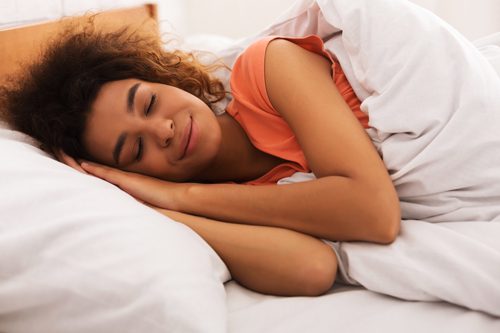
Sleep Problems in Recovery Are Very Common
Unfortunately, insomnia is a very common problem in recovery. The Journal of Addiction Medicine reports that people in the early stages of recovery are five times more likely than the general population to suffer from insomnia.
Trouble sleeping is a common symptom of withdrawal, especially for individuals who are in recovery from prescription opioid, heroin, cocaine, or alcohol abuse. Insomnia related to withdrawal will improve as time passes, but it can often take six months or longer for sleep patterns to normalize. The body requires time to heal from the damage caused by addiction, which means you must be patient with yourself.
Insomnia in recovery can also be a result of no longer being able to turn to drugs or alcohol as a way to wind down in the evening. If you’re accustomed to having a few drinks before bed, learning to fall asleep without your nightcap can be difficult. In this case, you need to create a replacement ritual that helps you unwind in a healthier way.
Finally, medical problems can play a role in insomnia for some people. Restless legs syndrome and obstructive sleep apnea are more common in people with addiction. Mental health disorders such as depression and anxiety can cause sleep difficulties as well.
9 Tips for Good Sleep Hygiene in Recovery
In most cases, the key to better sleep involves practicing good sleep hygiene. The term sleep hygiene refers to specific behavioral and environmental practices intended to promote better quality sleep. Recommendations include:
- Limit naps. If you’re tired, it’s tempting to make up for lost sleep whenever you can. However, napping too long only feeds the cycle of sleep disruption. It’s best to limit your nap to no more than 30 minutes.
- Don’t sleep in on the weekend. Sleeping in on the weekends is problematic for the same reason daytime napping isn’t recommended: deviations from your regular sleep pattern make it harder to recalibrate your natural sleep cycle. Try to get up and go to bed at roughly the same time each night.
- Watch what you eat. Heavy, rich, fatty, fried, or spicy foods can trigger uncomfortable heartburn for many people, which can disrupt your sleep. If you’re hungry in the evening, choose snacks that contain tryptophan, an amino acid that stimulates the production of serotonin. Try pairing low-fat milk, cheese, or yogurt with a complex carbohydrate for a nutritious snack designed to promote a more restful slumber.
- Cut back on caffeine. A cup or two of coffee in the morning can help you jump start your day, but you shouldn’t be drinking caffeinated beverages in the afternoon or evening hours. Too much caffeine can disrupt sleep by making you feel jittery and anxious.
- Let the sun in. Sunlight helps regulate the body’s circadian rhythms, which is why workers on the night shift often struggle to maintain a regular sleep schedule. Maximize your exposure to natural light by keeping your curtains and blinds open during the day.
- Create a comfortable sleep environment. Investing in a new mattress or new bedding may help you sleep better, especially if it’s been a long time since you replaced these items. Keep your bedroom cool, dark, and quiet. Blackout curtains, eye shades, ear plugs, or “white noise” machines can help you create a more soothing place to rest.
- Develop a bedtime routine. Having a nightly bedtime routine helps signal to your body that it’s time to relax. This might include taking a warm bath, doing a few relaxing stretches, reading, meditating, or writing in your journal.
- Don’t stay in bed when you can’t fall asleep. If you can’t fall asleep after 20-30 minutes, get up and engage in a quiet activity in another part of your home. Keep the lights dim during this time and head back to bed as soon as you feel drowsy.
- Stay away from sleep aids. Over the counter and prescription sleep aids are seldom a good solution to insomnia, but are particularly dangerous for people in recovery. These medications carry a high risk of dependence, abuse, and addiction.
Mountain Laurel Recovery Center Is Here to Help
At Mountain Laurel Recovery Center’s Pennsylvania drug and alcohol addiction recovery program, we’re committed to your success. Our experienced and compassionate staff members are readily available to address any recovery-related difficulties you may encounter, including insomnia and other sleep problems.
